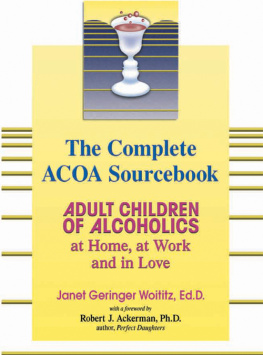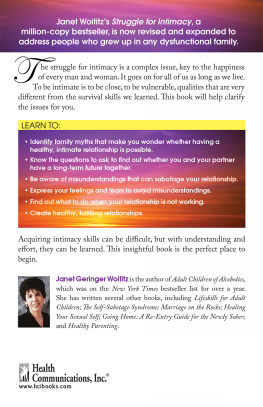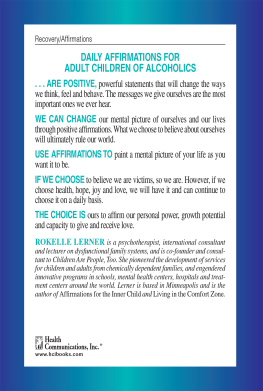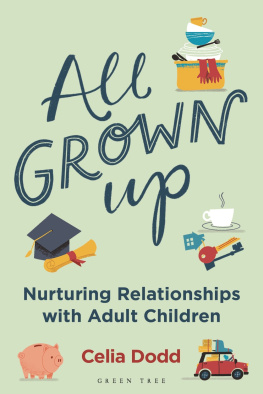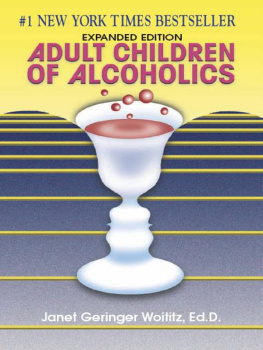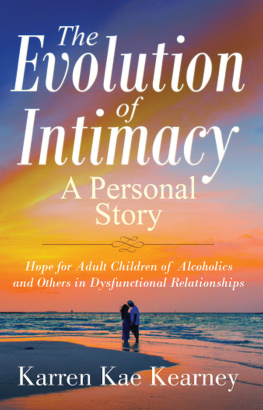The Complete ACOA
Sourcebook
Adult Children of Alcoholics at
Home, at Work and in Love
Janet Geringer Woititz, Ed.D.

Health Communications, Inc.
Deerfield Beach, Florida
www.hcibooks.com
Library of Congress Cataloging-in-Publication Data
Woititz, Janet Geringer.
The complete ACOA sourcebook : adult children of alcoholics at home, at work
and in love / Janet G. Woititz.
p. cm.
Includes bibliographical references.
ISBN-13: 978-1-5587-4960-3 (paperback)
ISBN-10: 1-5587-4960-8 (paperback)
ISBN-13: 978-0-7573-9541-3 (e-book)
ISBN-10: 0-7573-9541-4 (e-book)
1. Adult children of alcoholicsPsychology. 2 Interpersonal relations. I. Title.
HV5132 .W63 2002
362.2924dc21
2001052762
2002 Janet G. Woititz
All rights reserved. Printed in the United States of America. No part of this publication may be reproduced, stored in a retrieval system or transmitted in any form or by any means, electronic, mechanical, photocopying, recording or otherwise, without the written permission of the publisher.
HCI, its logos and marks are trademarks of Health Communications, Inc.
Publisher: Health Communications, Inc.
3201 S.W. 15th Street
Deerfield Beach, FL 33442-8190
R-07-07
Cover redesign by Lawna Patterson Oldfield
Inside formatting by Lawna Patterson Oldfield

A NOTE FROM THE PUBLISHER
T he following material from the late Dr. Janet Woititz originally appeared as three separate books: Adult Children of Alcoholics, published in 1983; The Self-Sabotage Syndrome, published in 1987; and Struggle for Intimacy, published in 1990.
We have combined the main body of these three books into one complete volume, in their entirety, with each book appearing as a part of the whole work The Complete ACOA Sourcebook. Although some material may be repeated, we felt it important to preserve the integrity of Dr. Woititzs work by maintaining the books original content.

FOREWORD
I am honored to write the foreword for these three very important works of Dr. Janet Woititz. For many years I had the privilege of knowing Jan. We shared much. There was work, countless speaking engagements, books to be written, stories to be told, laughter to be heard, interviews to be given, thousands of people who wanted someone to listen, and most importantlyfriendship. In 1994, after a gallant battle against cancer, Jan died. I miss her.
In June 1994, I was participating in a conference sponsored by the U.S. Journal in Philadelphia as both a speaker and as conference chair. Jan was going to be a speaker at the conference and, as usual, I was looking forward to seeing her and to introducing her to the audience. When I arrived I was informed that, due to illness, Jan had to cancel. I knew that she must have been very sick not to show up. On the evening of the second day, just as I was preparing to deliver my presentation, I was informed that Jan had died. It was decided by the conference sponsors that I should be the one to break the news that evening to the audience. It was a painful task and a difficult night. We had a lost a good friend. So many people had been touched by Jans work and life. There was not much to say, but there was a lot to be felt.
Now, years later, I am being asked to introduce Jan again by writing the foreword for some of her works. This feels right for two old friends.
In 1983, Jan wrote a book about adults who as children grew up in alcoholic families. She titled her book Adult Children of Alcoholics. Prior to that, in 1978, I wrote a book about children living in alcoholic families. I titled the book Children of Alcoholics. Obviously, we were both very creative with our book titles! But maybe that was the point. We took feelings of self-doubt, feelings of shame, feelings of being different and behaviors of denial, covering up, and pretending to be normal and gave them a name. We named the condition for what it waschildren and adult children of alcoholics. Straight to the point. Straight to the heart. No more denial, no more misdiagnosis, no more lack of intervention and no more excuses for not recognizing the impact of parental alcoholism on children.
During those years there were approximately 28.6 million children of alcoholics in the United States. Of those, about 22 million were adults. For them childhood was over, but not the impact. They were now adults and Jans work was not only a breath of fresh air, but also for many, it was the story of their lives written by someone who understood. Her work offered hope to the many victims of alcoholic families who believed that their lives were different and that surely something was wrong with them. Now, years later, their numbers continue to grow.
The three works that are contained in this book have helped millions of adult children of alcoholics to realize that there are reasons for the way that they think, believe and feel about themselves. There are reasons that adult children of alcoholics have often felt isolated, have had difficulty in relationships, at work or feeling good about themselves.
If you are an adult child of an alcoholic and you are reading this book, you will find out that many of your feelings, behaviors and thoughts are normal. Perhaps, more than anything else, Jan helped adult children not only to gain insight into themselves, but also to feel normal for the first time in their lives. And her work reveals that just because you are an adult child of an alcoholic does not mean that something is wrong with you. She tried to tell us that how you felt growing up with all of the limitations, fears, isolation and self-condemnation is not how you have to live as an adult today. As an adult child of an alcoholic you have something today that you did not have as a child. You have a choice. You can change. You can break the legacy of addictive families. Jan knew this, and it is the core of her writings.
Combining these three works into a single volume makes a lot of sense. This new work talks about adult children at home, in love and at work. In each of these areas, we find that the experiences of growing up in an alcoholic family are apparent. In Adult Children of Alcoholics, Jan helps us to understand ourselves by examining many of the thoughts and behaviors shared by many adult children. She offers insights and strategies for overcoming childhood trauma and hope for our futures.
In Struggle for Intimacy, we find the core of most problems for adult childrenhow to develop healthy relationships. She shows us that all the ingredients of being truly intimate, such as being vulnerable, allowing others to get close and liking ourselves, are the exact opposite of the survival skills developed by most adult children of alcoholics while they were growing up. She also shows us that just as we learned to protect ourselves from emotional pain while growing up, we can now learn the necessary skills to improve our relationships.
Finally in The Self-Sabotage Syndrome, we find that the very characteristics and behaviors that often make adult children very successful occupationally can be the very same characteristics and behaviors that put us at such a high risk for professional burnout. We might make great employees because of our workaholism, perfectionism and willingness to accept responsibility, but without self-care we are in danger of self-destructing.

